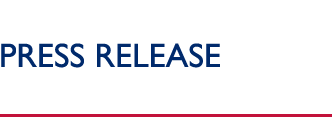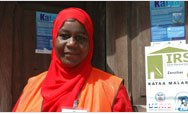U.S. Announces Community Grant Awards to Fight Malaria
FOR IMMEDIATE RELEASE
October 23, 2008
Press Office: 202-712-4320
Public Information: 202-712-4810
www.usaid.gov
WASHINGTON, D.C. - The U.S. government, through the U.S. Agency for International Development (USAID), announced over $11 million in grants to eight organizations working in seven countries in Africa to extend the coverage of malaria prevention and control activities in communities most affected by malaria, particularly children under age five and pregnant women. The grants were provided through the President's Malaria Initiative (PMI), an interagency initiative led by USAID with the Department of Health and Human Services and the Centers for Disease Control and Prevention as key partners.
The Malaria Communities Program (MCP) providing these grants is a $30 million initiative created under PMI to support the efforts of communities and indigenous organizations to combat malaria in Africa. First Lady Laura Bush first announced the MCP at a White House Summit on Malaria in December, 2006. The program specifically aims to identify organizations that are new to partnering with the U.S. government and are uniquely positioned to work at the community level. The program also seeks to increase local and indigenous capacities to undertake community-based malaria prevention and treatment activities and to build local ownership of malaria control for the long term. MCP grant recipients will operate within respective PMI country strategies, which have been developed in collaboration with each country's Ministry of Health and National Malaria Control Program, with in-country partners, and with other donor organizations working in-country.
"I am committed to expanding the work of nongovernmental and faith-based organizations, and other community based entities to reach people with the tools and knowledge to control malaria," said R. Tim Ziemer, U.S. Malaria Coordinator. "The key to saving lives, especially children, is to expand proven approaches and interventions until they reach each and every child who needs them."
Grant information:
Concern Universal Malawi
Concern Universal, in partnership with the Holy Family Hospital and the District Health Office, will implement a 4-year, $1.3 million malaria program targeting approximately 60,000 under-five children and pregnant mothers in the Phalombe District in southern Malawi. Through community education and training activities, the project will increase community awareness and knowledge on malaria prevention, treatment and case management; promote correct and consistent use of insecticide treated nets (ITNs); increase access to intermittent preventive treatment (IPT) among pregnant women; and build the capacity of indigenous organizations in malaria management.
EQUIP Liberia
With a three-year grant totaling $1.5 million, EQUIP will deliver malaria prevention and treatment to an estimated 285,000 individuals in two counties in Liberia. Through community mobilization, training of community health workers, and institutional capacity building, Equip will provide assistance to promote the importance of pregnant women and children under five sleeping under an ITN; provide early and correct diagnosis and treatment with artemisinin-based combination therapy (ACT); and improve the proportion of pregnant women receiving two or more doses of sulfadoxine-pyrimthamine (SP) during pregnancy.
The Mentor Initiative Liberia
Through a three-year $1.5 million grant, The MENTOR Initiative and its partners will implement a malaria program in Liberia, covering five counties with a total population of more than 655,000, including more than 105,000 children under five and 30,000 pregnant women. The program will focus on building the capacity of local partners to design and deliver malaria education campaigns; develop and deliver effective community level Information, Education, and Communication (IEC) materials; and ensure effective malaria case management through the training of community health workers and midwives.
Caritas Senegal
Caritas Senegal, in partnership with the National Association of Private Catholic Health Posts, will implement a 3-year, $1.5 million malaria prevention and treatment project targeting four districts in Senegal. The program will directly reach more than 930,000 people, including an estimated 200,000 pregnant women and children under five relying on the well-developed network of community health educators, called relais, and other community organizations in communities, health huts and health posts. It will do so by delivering malaria prevention and education programs increasing access to ACTs, and promoting household ownership and proper use of ITNs.
Aidez Small Project International (ASPI) Ghana
Through a 3-year, $1.1 million grant, ASPI will continue its successful partnership with Keta District Health Directorate to deliver its malaria treatment and prevention program in 23 communities in the Keta District of Ghana. ASPI also plans to expand its program into two additional districts, Ketu South and Ketu North, with the goal of working in 95 communities by 2012. The program will reach an estimated 152,000 people by distributing ITNs and promoting consistent and correct use of them; training community agents to implement malaria services and education; organizing bed retreatment campaigns; conducting house-to-house visits to ensure accurate use of preventative treatment among pregnant women; and promoting early recognition by care givers of malaria symptoms among children under five, to ensure prompt treatment with ACT.
Fayyaa Integrated Development Association (FIDA) Ethiopia
The FIDA will implement a $1.5 million, 3-year program targeting an estimated 1.7 million people in the Oromia region of Ethiopia. Through its existing large network of churches, mosques and schools, FIDA will work to improve the capacity of community and faith based organizations, health committees and other community groups participating in malaria prevention and treatment activities; provide targeted IEC materials to households; ensure high quality malaria diagnosis and treatment in the private sector; link malaria control to FIDA's existing HIV/AIDS projects; and strengthen malaria prevention and treatment during pregnancy through delivering integrated services in antenatal clinics.
HealthPartners Uganda
HealthPartners and its affiliate, Uganda Health Cooperative, will implement the Uganda Health Cooperative Malaria Communities Program, a 4-year $1.3 million project to build local capacity and ownership of a sustainable system for community based malaria prevention and treatment activities in the Bushenyi district in Southwestern Uganda. Reaching an estimated 730,000 people, the program will partner at the community level by training community drug distributors; implement education and behavioral change activities promoting ITN use, the importance of preventive treatment among pregnant women, and recognition of malaria warning signs and the need for early treatment; integrate supportive supervision for antenatal clinic workers; will implement training on the use of severe malaria drugs and the new National Malaria Control Program malaria treatment policy; and improve stock management of malaria drugs.
ADPP Angola
Over a three-year, $1.5 million grant, ADPP will address malaria prevention and treatment needs of an estimated 100,000 people, including 25,000 pregnant women and children under five in Zaire province of northern Angola. The program will increase the demand for ITNs and ACT by working with teachers in nearly 200 primary schools to reach the families and communities of school children with information, education, and communication on malaria prevention and control, and practical preventive measures. ADPP will work with other NGOs and church organizations to strengthen connections between the community and existing health services to increase health seeking behavior and demand for malaria services in their target communities.
For more information about USAID and PMI, please visit www.usaid.gov.
The U.S. Agency for International Development has provided economic and humanitarian assistance worldwide for nearly 50 years.
Back to Top ^
|


